Francesca
Francesca approaches food in an organic and fluid way. She is and has done many things around food: filmed a documentary, organised festivals, hosted a radio show, and yes, is also a cook and a chef.
Francesca approaches food in an organic and fluid way. She is and has done many things around food: filmed a documentary, organised festivals, hosted a radio show, and yes, is also a cook and a chef (although she has a complicated relationship with that).
Francesca and I connected almost a year before we actually met. At the time, she lived in Madrid and, since then, she has moved to Lisbon and then Oslo. The day we finally meet, it’s a sunny October bank holiday in Spain. Since neither of us lives here, we've spent the morning texting, trying to figure out which markets might be open whilst the parade is underway.
After some meandering, Francesca found one that was open and got some bits for our lunch. When she arrives in my mother's kitchen, she pulls tomatoes, fennel and cheese from her bag. My friend Ginevra, who’s taking photos, Francesca and I intend to make a salad: a perfect meal for a group of people who don’t know each other too well and are cooking in a kitchen that isn’t theirs. On that day, together, we’ll get to know one another as we choose from the badly sharpened knives in my mother’s kitchen, and try to figure out where the vinegar is.
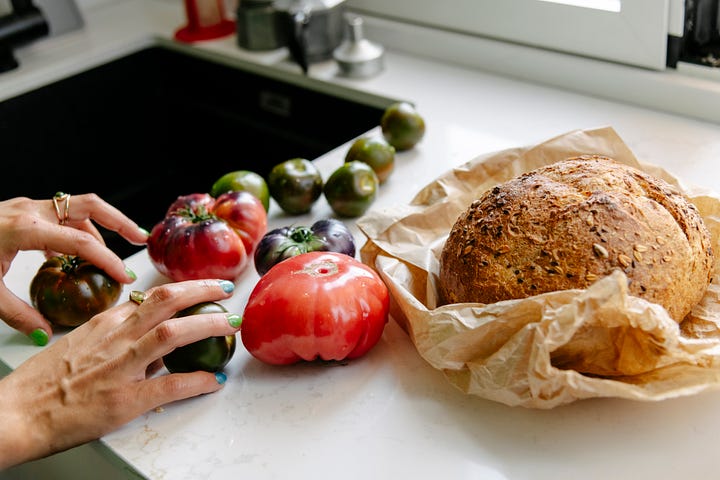
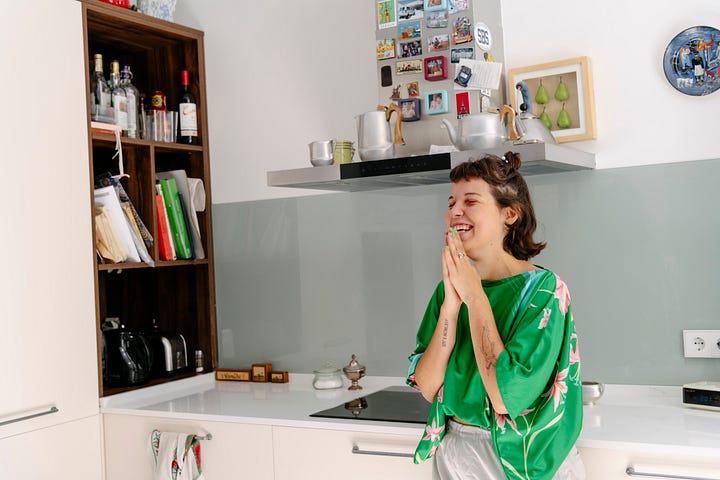
Francesca grew up in Buenos Aires with her Italian family. She doesn’t have a specific first memory about food and doesn’t remember when she first started cooking. She just knows that it has always been there. She grew up visiting her grandfather’s cheese cave and making blood sausage with her maternal family. As a kid, she was fascinated by the ritual of parillas, or Argentinian barbecue. In her family, like most others, the men took care of the fire and the meat, while the women prepared the salads and set the table. Yet, when the food made its way to the table, the men and their meats were the only recipients of congratulations and thanks. She remembers thinking two things: first, this is weird and second, I want to be congratulated like that. So, one day, while everyone else was taking a nap, she lit a fire and got ready to make the meat, but got told off by an uncle. Sure, she was little, but also, she was a girl. Even though food was a central part of her life, she realised it wasn't neutral—it was gendered.
"I would go [with my family] when they slaughtered the animal, or when they made charcuterie, so I was always very involved in the whole anthropological process”.
So, with time, she became an expert in fire. At 18, she hosted a radio show called “Grill Girl”, in which she talked about feminism in Argentinian gastronomy, and how people should rebuild the traditions of barbecues and family reunions. She then finished her culinary training and moved to Europe to work in world-class restaurants all across the continent, including in a famous Argentinian barbecue chef's restaurant.
And yet, people kept telling her off, like her uncle when she was younger. In kitchen after kitchen, she was undermined, bullied and abused. She was yelled at; groped; locked in cold rooms; given tasks that should have been split between multiple people and had her phone thrown across a room. So ultimately, she decided to step away from the world of restaurants.
As she tells me this, we’re washing the tomatoes and looking through my mother’s knives, looking for one that will do justice to the fresh herbs she’s brought. Our conversation jumps from talking about her life to discussing tomatoes and how, before they were commonplace in Spanish and European cuisine, they were grown in the wild in the Andes, the mountain range running on the West of South America, from Venezuela to Chile.
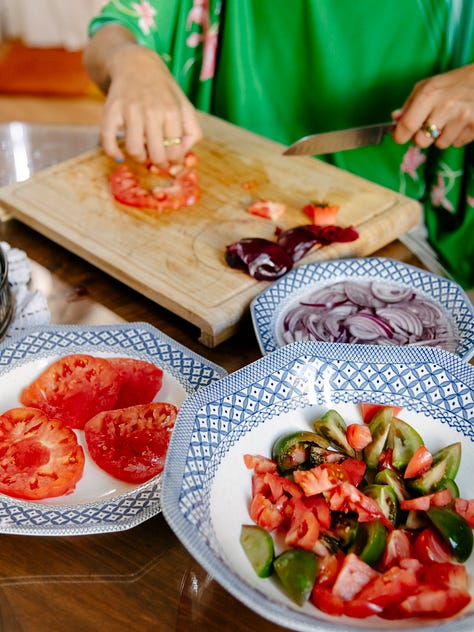
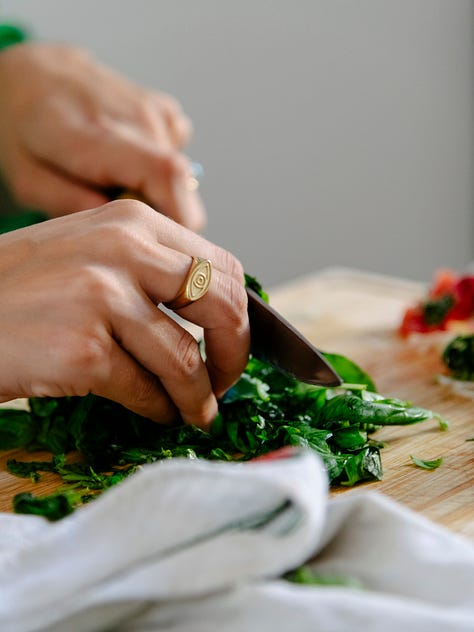
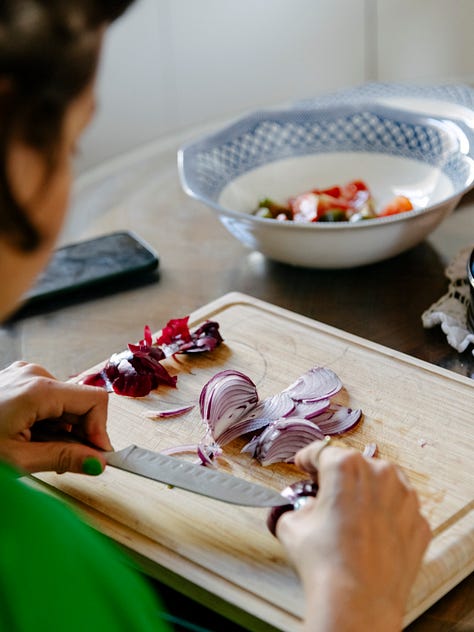
Despite stepping back from formal dining, food remains at the core of who Francesca is and what she does. I came across her through her exploration of food waste, not for her work as a chef. When she first moved to Madrid, she was developing a documentary about Latin American immigration to Madrid, and what this meant for food. Through this, she spent a lot of time in Madrid’s mercados de abastos, or wholesale food markets, where she made her documentary and organised a festival with the people who worked there.
In these markets, she was faced with the amount of food that was thrown away. She felt it was deeply wrong that while millions were hungry, food was being thrown away. Today, while about one-third of the food produced for human consumption is lost or wasted, one in three people globally are affected by malnutrition. To her, this is inherently unethical. Her obsession with food waste came to a head in Madrid, but she’d had an eye on waste before this. Back when she was still in Argentina, she had opened a plant-based and offal restaurant, so the only meat they served were the cuts that are too often ignored or thrown away,
At the core, Francesca's beliefs are rooted in two main ideas: first, food sovereignty, meaning people have the right to shape their own agricultural and food policies; and second, ecofeminism, which links women's oppression under patriarchy to how plants and animals are controlled in today's food system.
She brought these two beliefs to life when she started Child Collective as a way to re-value the food that was going to be wasted in Madrid’s wholesale markets. A group of volunteers and her paid for the fresh fruits and vegetables that would overwise get wasted. They wanted to show that it had value, that it was food, not rubbish. At first, she tried to donate it to food banks but due to Covid-19, it was impossible at the time. While today, there is a policy in Spain whereby supermarkets have to reduce food waste by either lowering prices or donating leftover food to food banks, it’s hard to know how effective this is. Over time, this ragtag group of volunteers were rescuing and transforming 3,000 kilograms of food per week. The collective transformed these salvaged vegetables into broth, pickles, conserves, and hosted cooking classes focused on salvaged vegetables. Francesca, who prior to going to culinary school had studied fashion, started incorporating food waste into the production of made from living organisms, like kombucha biolether or vegetable biocellulose.
“In the food waste I found that there were too many things... At first I was hesitant, and I remember my grandmother telling me “why are you showing people’s rubbish?” I never cared about that, I have always been obsessed with rubbish to a certain point.”
After she left Madrid, she moved to Norway, where a friend and her opened Stup. In this restaurant, they asked: “what are we going to use and why and with whom?” They cooked Pacific oysters, an invasive species that in Norway are destroying the native seaweed ecosystem and are not normally eaten. They bought old egg-laying chickens which they had to cook for three days to serve as pulled chicken. They chose to work with a Norwegian quinoa producer, because while the production of quinoa is threatening indigenous communities in Peru, the conditions in some parts of Norway were perfect for it to be produced locally.
While she talks about her work in Norway, she’s cutting a tetilla, a typical Galician cheese, and mixing some fresh herbs in with the tomatoes. Together, we rummage through drawers, choosing serving dishes from my mother’s collection. As the conversation moves from the kitchen to the dining room, our conversation expands, moving beyond food to the rights of indigenous communities in Oslo and what it’s like to be queer in the different places we’ve lived.
A friend of mine, Paola, joins us in time for lunch. Francesca serves us the kind of simple salad that we all believe we could make, but somehow, when you bite into it, it feels so uniquely Francesca’s. The large tomatoes are the centrepiece of the meal, in the way that a steak might traditionally be. Alongside it, the fennel and tomato salad, with tuna and fresh herbs, reminds us that despite the heat, fall is coming.
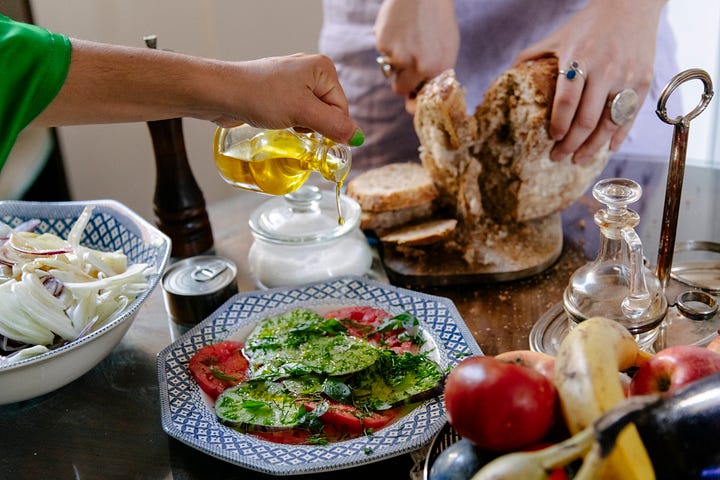
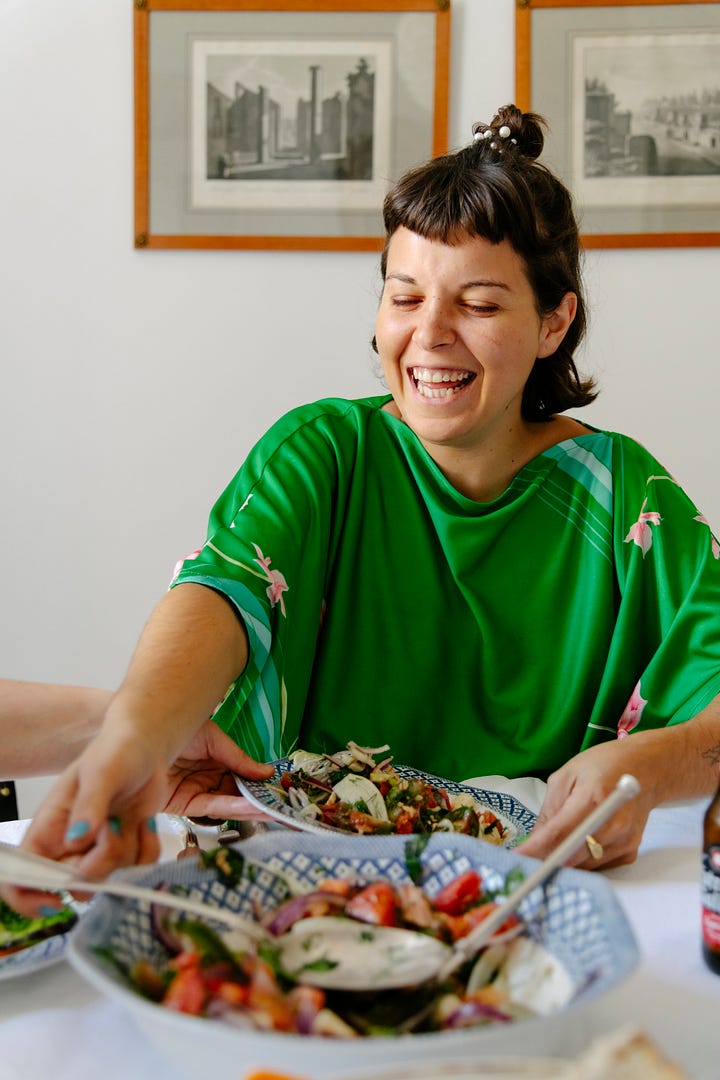
Today, Francesca no longer works in kitchens. Instead, she’s exploring and digging into the anthropology of food: how it is grown, cooked and eaten across Europe and Latin America. Ultimately, she never wanted to make food or products for the 10% that could afford it in Europe. She’s always wanted to connect back to Latin America, so since we met, she’s travelled home to Argentina, Uruguay and Mexico, to dig into indigenous practices of conservation and fermentation.
As our lunch comes to an end, we are all doing scarpetta, using pieces of bread to soak up every last drop of olive oil and tomato juice. At this table, no one is wasting food.
Thank you to Anna, Bryony and Dulcie for reading earlier drafts of this story. The most delightful part of writing this article was seeing friends who don’t know each other, get to know each other in the comments.
Francesca Imbrosciano is a chef and designer with a unique passion: tackling food waste in innovative and decentralised ways. She is the founder of Child Collective to bring together art and science to focus on circular design and the recovery of what we call waste. Currently she splits her time between a residence in Alborg, Dinamarca, where she addresses the problem of water pollution in the city through biomaterials, and Patagonia, where she collaborates with other experts in regenerative agriculture to create a sustainable, edible forest.
Ginevra Formentini (@ginevraformentini) is a photographer born in the Friuli-Venezia Giulia region (Italy) in 1990. She lives and works between Paris and Venice, where she specialises in architecture, landscape and portrait photography. She develops projects linked to the environment’s heritage of a specific territory and the relationship humans who live there have with it. In 2020, her work was exhibited at Micamera Bookstore in Milan, and her work “Greeting from” was included in the book “Mikros”, published by Door Publishing.






